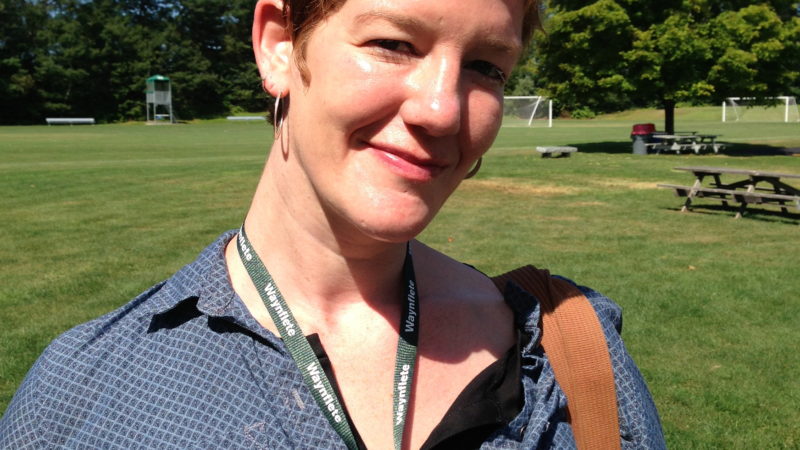Reflections on Being New at Waynflete
Having heard about Waynflete’s reputation for excellence since I was a teenager in Portland, I was thrilled to be offered a job here teaching French. I knew that I would need to make some cognitive adjustments when I got here, as well as some professional adjustments, because everyone kept telling me how different Waynflete was. Ok, I thought. Different. Fine. I can handle that; every school is different.
Looking back, I can be honest and say that what I really thought as I prepared myself to transition to Waynflete was, “There’s a subject, there is a textbook, there are students, there is a teacher, there are grades. How different can it be?” I thought Waynflete was probably a pretty good place with a bunch of exceptionally enthusiastic cheerleaders. The thing about cheerleaders, though, is that they do the same routine when the team is losing as they do when it’s winning, so it’s hard to gauge the reality of the game just by looking at them.
My learning curve that fall was steep. I was surprised by so many things: cupcake trucks and celebrations, faculty/student hugs on the first day of school, the Advising Olympics (I think I can safely say I wasn’t the only person surprised by that day), the conviviality of the year’s beginning. I could go on and on.
The real turning point, however, to understanding (and embracing) the Waynflete culture and community had to do with my name. As a scholar of literature and history, I understand perfectly well how important names are. So I made the decision at the beginning of the school year to allow students to use my first name, Lindsay, or to call me Madame, which they were already comfortable with because of their previous French teacher. I thought this would encourage the students not to think of me as someone learning the ropes at Waynflete, but instead to have the impression that I was a great fit here from the get-go. Many chose to call me Madame, but just as many chose to call me Lindsay.
Though I was satisfied with myself for taking this step, it took a really long time before I was comfortable with it. When a student said my first name, it set off alarm bells in my mind. Quite a few times I found myself whirling about, ready to reprimand a student’s cheekiness, only to be reminded by the offending student’s calm, expectant face that the behavior was both permitted and encouraged.
One day, mid-whirl, I realized why I just couldn’t get past the first name thing: it felt so intimate. Tumbling after this realization came the second one: that’s the point. I recalled that someone had told me at the beginning of the year that Waynflete strives to help students build respectful and trusting relationships with non-parental adults. To this end, some of the traditional trappings of authority relationships are left behind in favor of more community-oriented behaviors. Does this mean I don’t have authority in my classroom? Of course not. But it definitely changes the way I view that authority, along with my job, the students, and even my content area. The same, I now see, is true for the students.
What does this mean? I’m still not totally sure I can articulate it all, but here are some preliminary findings:
- Everyone is moving in the same direction. I don’t mean we are all the same, but that we all have the same project, which is that each student not only succeed, but also define what success means for him or herself.
- Waynflete is a YES place. Experiencing YES has made me realize how much of the world is actually made up of NO. I don’t mean that the school is too permissive, but that within this community the expectations and perceptions of students and for students are overwhelmingly positive and supportive. My job as a teacher is to guide students toward success, not to prevent them from failing. Wow! Success is an assumption, not a dream. Because so much of reality is formed by perceptions, especially in a child’s developing brain, a YES school prepares children for a YES life. This is awesome. I don’t know why parents don’t jump for joy every time they set foot on campus.
- At Waynflete, I have the time and the space to connect with my students as individuals. When there are thirty students in a French II classroom, everything takes longer. Relationships are slower to develop. All teachers in those circumstances have less of a chance to scrutinize the performance and the capacity of each student, and therefore are less likely to be able to provide a truly differentiated learning environment capable of reaching all the students. But we have small classes here. That means that each student gets the attention they need, each student participates, and each student has a voice and learns to use it.
When my students go out into the world, they will look for and demand to be taken seriously. They will seek accord, not opposition, from their mentors and superiors in college and in the workplace. They will expect YES, so they will hear it. It is not possible to overstate the importance of this difference in the life of a child. It’s also hard quantify the importance of it in my life as a professional, but I will say that the ripple effects of my own changing perceptions about the school experience are reaching all the corners of my life, from my work day to my home life, and even the way I relate to my own son.
Respectfully submitted,
Lindsay Kaplan



